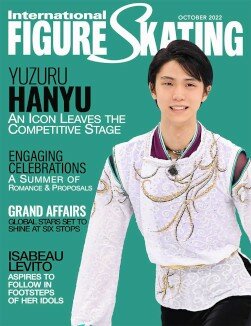

Sara Hurtado and Kirill Khaliavin hope to follow in the footsteps of Javier Fernández, the Spanish trailblazer who put his nation on the figure skating map.
Hurtado and Khaliavin took their first step in that direction when they claimed Spain’s first Grand Prix medal (silver) in ice dance at 2018 Rostelecom Cup.
Sara Hurtado’s ice dance career began with Adrián Díaz in 2008. They were the first Spanish team to compete internationally and the first to represent their nation at an Olympic Winter Games (2014), where they finished in a respectable 13th place.
In 2015, Hurtado and Díaz parted ways and both continued their careers with new partners.
Kirill Khaliavin, the 2011 World Junior champion who formerly represented Russia with Ksenia Monko, went in search for a new partner when injuries forced Monko to retire at the end of 2015.
In the spring of 2016, Khaliavin and Hurtado formed a partnership and she moved to Moscow to train with his coach, Alexander Zhulin. “All cities are so different. Each has its own magic but actually, it has been an easy adaptation,” said Hurtado, who is now learning to speak Russian.
She also likes the fact that Moscow is much closer to Madrid than her former training base in Montréal, Canada. “In four and a half hours I’m in Madrid. It helps me not to feel as homesick as I am able to go home more often.”
Khaliavin, who received Spanish citizenship in 2017, is learning the language and Hurtado said he has made good progress.
Last season was an exciting one for Hurtado, 26, and Khaliavin, 28. With two ice dance teams vying for Spain’s lone Olympic berth, it was a tight battle between them and Díaz and his new partner, Olivia Smart.
Hurtado and Khaliavin earned the spot in PyeongChang, where they finished in 12th place. Both were inspired by the Olympic experience, which motivated them even more. “I think we didn’t show our best yet and that is the best motivation — when you know you can skate better, do better elements and better programs,” Khaliavin said.
Smart and Díaz were sent to the World Championships, which provided Hurtado and Khaliavin extra time to prepare programs for the post-Olympic season. Alexander Zhulin and Sergei Petukhov choreographed their rhythm dance to two Tango pieces: “I’ve Seen That Face Before,” and a modern arrangement of “Libertango.”
For the free dance, the duo decided to try something new, and turned to Iker Karrera Peña, a Spanish dancer who had never previously worked with figure skaters. “He was a choreographer for a show in Spain similar to ‘So You Think You Can Dance,’” said Hurtado, who loved the show and had followed it on YouTube.
She was in Madrid when the finale took place and decided on a whim to get in touch with Peña via Instagram, “just to test my luck. He answered super-fast and said that he was travelling a lot but would be in Madrid on a certain date. It was perfect timing for us because we were going to be in Madrid also. Everything just clicked. “He had watched figure skating on television now and then, but he knew nothing, like zero. But he was super open to work with us and OK with the music we had chosen — ‘Great Gig in the Sky’ by Pink Floyd, ‘Vladimir’s Blues’ by Max Richter and ‘Sign of the Times’ by Harry Styles. It was a bit of a risky move. Mixing Harry Styles with Pink Floyd is not something everyone does. It wasn’t a safe choice.”
Hurtado and Khaliavin worked with Peña to develop the concept of the program. “It went back and forth and then he (Peña) put the last bow on it. He put it all together,” Hurtado explained. “Seeing the final outcome and how everyone feels the energy — maybe they don’t fully understand the story we are telling, but they sense the energy and get it. I think that is the best gift that we can give to the world: a memory, an emotion. I love that. I think the free dance is a hit because of the choreographer we chose. It’s such powerful music that you don’t want to go to the extreme of being super dramatic because it can be very overwhelming instead of giving that message of hope.
“Nowadays we live in a world where, all the time, we are making the same mistakes; there are wars, human rights are being violated and people going against each other for the silliest things — just so much anger. If Kirill and I are able to work together to make something beautiful, then everyone can. We can build a better society and better world for everyone by just working with each other.”
Hurtado and Khaliavin opened their season at Lombardia Trophy in September, where they captured the bronze medal. Khaliavin said they wanted to start the season a bit earlier compared to the previous one. “In our first year, our first competition was nationals because we were not able to start sooner. The second year we had a late start at Finlandia Trophy and during that season we understood that our best performances came at the end of the season.
“That is why we decided to start a bit earlier this year to be in good shape for the Grand Prix. We chose Lombardia because you can work at your home rink, but the changes and improvements come faster after your first competition.”
“With all the new rules this year, it was very important that we were on the right path with our programs and choreography,” Hurtado added.
They had planned to go to Finlandia Trophy, but four days before the competition began Hurtado suffered a bruise to her abdomen while working on a lift. “There was no way I could compete without sacrificing the Grand Prixs,” she said. “I did not stop skating totally because it was so tight with the competitions ahead, but we had to cool it down. We were still able to do some skating and improve some things and it was the best choice for us. I recovered totally and now am much stronger.”
The duo made its Grand Prix debut in Helsinki, finishing fourth. Although both had competed in the Series with their previous partners, it still felt new to them. “It was good, a different experience because there are only two groups … it’s dynamic and, at the same time, it is the best teams, so it is really high quality, really intense. Just being invited to two Grand Prix events was a goal already achieved,” Hurtado said.
Two weeks later they made history when they landed on the second step of the podium at Rostelecom Cup — the first Spanish ice dance team to ever medal at a Grand Prix competition. “Having it (the medal) in my hand was like, ‘Oh my God! This happened!’ It was really exciting and emotional for me because Maria Teresa Samaranch was there,” Hurtado recalled.
“She was the president (of the Spanish Federation) when Adriá and I started skating and is actually the reason we started doing ice dance. So, it was like coming full circle with her awarding us the medal. It was really special. She said everything with her eyes. If she had spoken to us she would have gotten more emotional. I hope it is the first of many more to come.”
For Khaliavin, winning a medal in his hometown of Moscow with many friends and Monko (now his wife) watching was special. “It was really an emotional thing. I feel more satisfied with our work, our performances and how we are trying to grow in in competitions,” he said. “This is what has given us the result. So, it was a very good point in the season and a moment from which we will grow even more.
“For me it is not like a final happiness. It’s a good point to get the medal, especially in Moscow, in front of the people that know you. A lot of my friends and the people with whom I have been competing in Russia were watching in the stands and on national television.
“That moment was very emotional for me. I am really proud that we got the medal in Moscow. We were fighting for that. We made mistakes that we should fix and be less nervous in the fight with our opponents. We can improve our scores and we can make clean run-throughs next time, but getting the medal was a very satisfying moment for me.”
Both agreed they have been making good progress this season and are in better shape than at the same time a year ago. Their plan was to take the feedback they received from their Grand Prix Series competitions and make further improvements to their programs.
“That is what we usually do after competitions — we sit with and talk with our coaches about what we can improve, look at what the good things and the bad things were to understand what we need to fix, and what we are going to focus on for the next period of time,” Khaliavin said. “We just collect all the feedback and make the right corrections. Right now I cannot say exactly what we are going to work on — a bit of everything in every practice that’s for sure.”
“Yes, it’s non-stop,” Hurtado added with a laugh.
The duo placed seventh at the 2019 European Championships. They now have their sights set firmly on a top-five finish at Worlds in Saitama.
(Originally published in the IFS February 2019 issue)




